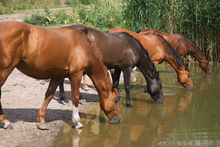Back in May of 2012, U.S. Border Patrol agents seized 10 adult horses and four yearlings as they attempted to enter Texas illegally by walking across the Rio Grande River near Indian Hot Springs, in southern Hudspeth county, south of El Paso.

Disease threat from smuggled horses
Horses and other livestock smuggled across the Mexican border increase the risk of horses coming into the US with infectious diseases such as piroplasmosis which could lead to epidemics in the United States.
© 2013 by April Raine
The horses were turned over to the United States Department of Agriculture, Animal Plant Health Inspection Service, Veterinary Service) officials, who tested the horses in Presidio, Texas for a number of disease conditions that are considered foreign to the U.S.
All 10 of the adult animals tested positive for Equine Piroplasmosis (EP). EP is routinely found in Mexico and numerous other countries around the world, but is not considered to be endemic to the U.S. The blood borne protozoal disease can be fatal to horses and could create major constraints to interstate and international movements if left undetected. EP does not affect humans.
Now in May 2013, Dr. Dee Ellis, State Veterinarian and TAHC Executive director is again asking the public along the border to be on the alert for unusual livestock activity that might indicate horses and other livestock are being illegally brought across the border.
According to Dr. Grant Wease, field veterinarian for USDA/APHIS/VS in El Paso, the illegal movement of animals is an ongoing concern in the vast open spaces of West Texas. “In some places the Rio Grande poses no barrier at all to foot traffic for man or animal.”
According to the latest USDA information, Dr. Wease indicated that “In 2011, approximately 280 head of cattle and 160 head of equine (primarily horses) were intercepted by USDA officials along the Rio Grande.” To further complicate the situation, many of the normal import processes for livestock entering Texas have been impacted by border violence, making the attempt to smuggle animals into the state even more tempting.
The investigation by USDA and Texas Animal Health Commission is ongoing to determine not only the source of the horses, but the possible destination as well. The TAHC recently passed EP rules requiring testing of race horses prior to entry into a Texas track, and numerous other states have done the same because of recent cases found in that population of horses.
“Racing Quarter horses with some connection to Mexico appear to be at highest risk of testing positive to the emerging disease,” according to Dr. Dee Ellis, State Veterinarian and TAHC Executive Director. Although the interdicted horses were described as Thoroughbreds, they were considered to be more likely breeding type animals rather than race ready horses.
Dr. Ellis went on to state, “This situation highlights the ongoing border security problems Texas is facing, which leads to an increased risk of disease introduction for the Texas livestock population when animals enter our state illegally. I encourage all citizens that witness unusual activity regarding livestock movement near the Mexican border to contact their local law enforcement or animal health officials as quickly as possible to report the situation.”
